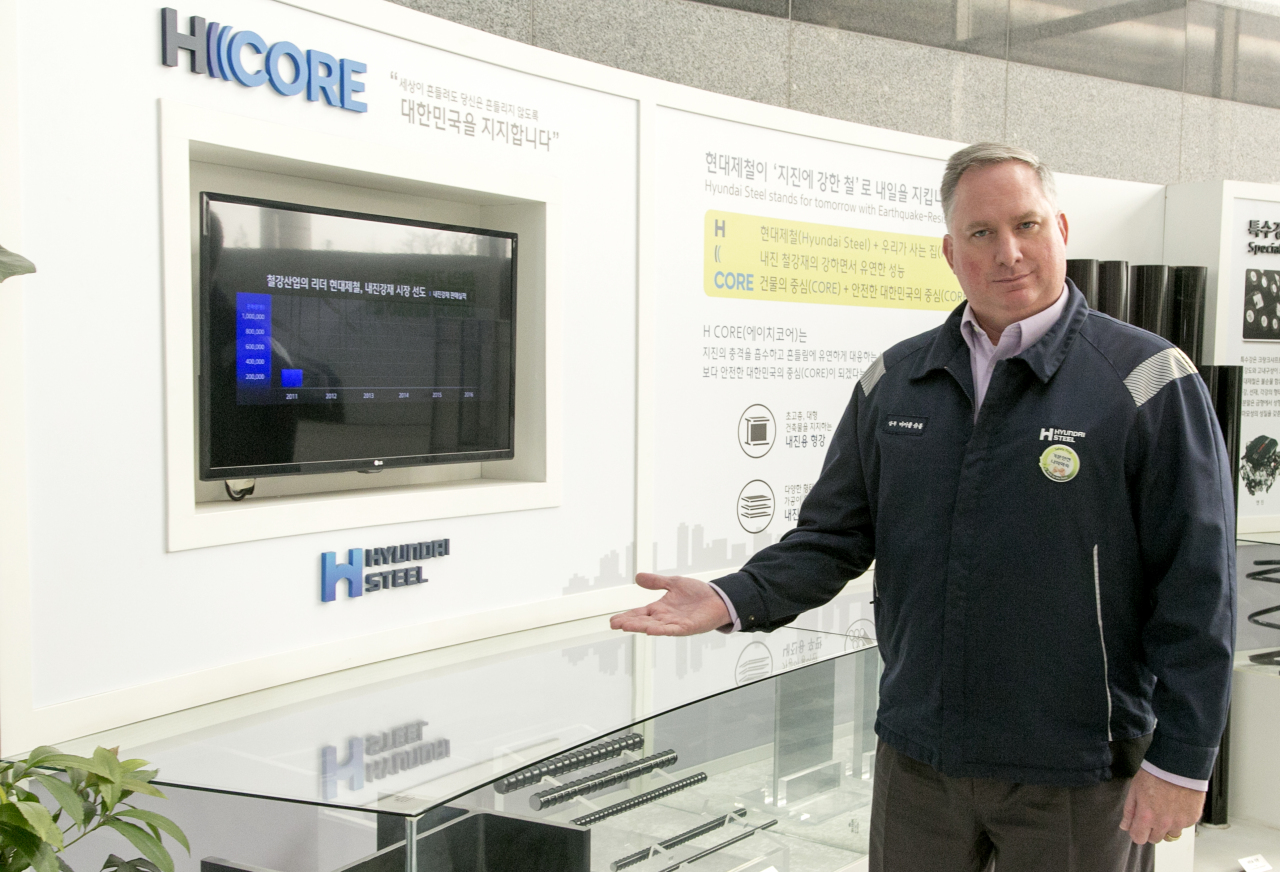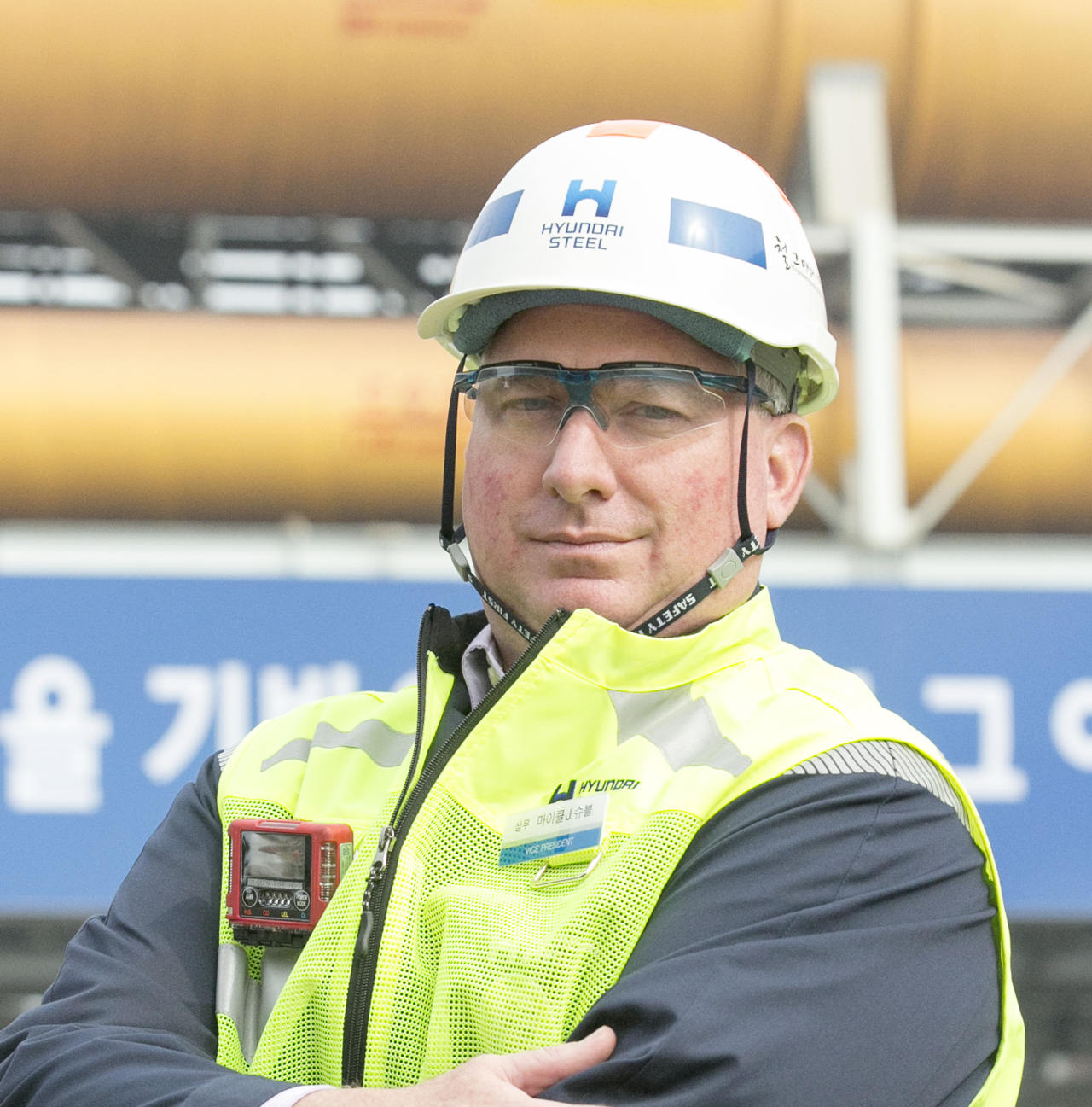[Foreign Execs in Korea] Planting safety culture at Hyundai Steel
US safety expert joins steelmaker’s leadership to create ‘zero harm’ workplace; cites corporate hierarchy as hurdle for open communication
By Cho Chung-unPublished : Oct. 20, 2019 - 15:59
DANGJIN, South Chungcheong Province -- Despite increased automation, the steel-manufacturing industry remains among the most dangerous workplaces.
Promoting safety awareness, building stronger compliance and ensuring continuous investments in safety features are crucial to turn steel mills into “zero harm” workplaces. And Hyundai Steel, the nation’s second-largest steelmaker, aims to set the example.
“We want to change from a ‘have-to’ environment to a ‘want-to’ environment. That willingness for everybody to understand what’s in their best interest and start to look out for people around them … to be able to become brother’s keepers,” said Michael Shuble, vice president and head of the safety planning group at Hyundai Steel, in an interview with The Korea Herald.
“Look out for your safety and safety of those around you, and how that transitions not only the workplace but out into the society is really a key as well, how we can challenge and motivate changes in their individual lifestyle (to be) less risk-taking, not only educating them on safety compliance, but also on life safety in the community.”
Heavy investment for safety
Shuble, 49, is a new member and the first foreign executive to Hyundai Steel’s leadership, which has been investing heavily in safety measures and education programs.
Promoting safety awareness, building stronger compliance and ensuring continuous investments in safety features are crucial to turn steel mills into “zero harm” workplaces. And Hyundai Steel, the nation’s second-largest steelmaker, aims to set the example.
“We want to change from a ‘have-to’ environment to a ‘want-to’ environment. That willingness for everybody to understand what’s in their best interest and start to look out for people around them … to be able to become brother’s keepers,” said Michael Shuble, vice president and head of the safety planning group at Hyundai Steel, in an interview with The Korea Herald.
“Look out for your safety and safety of those around you, and how that transitions not only the workplace but out into the society is really a key as well, how we can challenge and motivate changes in their individual lifestyle (to be) less risk-taking, not only educating them on safety compliance, but also on life safety in the community.”
Heavy investment for safety
Shuble, 49, is a new member and the first foreign executive to Hyundai Steel’s leadership, which has been investing heavily in safety measures and education programs.

Between 2013 and 2015, the steelmaking subsidiary of Hyundai Motor Group, injected 500 billion won ($424 million) to align its safety programs from A to Z.
A 2,750-square-meter health and safety center, located at the heart of the steelmaker’s Dangjin headquarters, is part of the 500 billion-won investment, housing 11 demonstration facilities designed to educate both regular and contract workers.
Since opening its doors in 2014, the center has provided safety education programs to more than 170,000 people. Aimed at building a safety culture that continues to expand for a hundred years, the center has a list of programs on human error and facility safety, such as isolation and locking system.
“We have a wonderful safety training center here, probably world-class to me. I would equate it to a college-level facility, the best I’ve ever seen,” Shuble said.
“So we’re looking at the curriculum and the agenda to see what improvements we can make and somewhat improve the learning model to get more utilization out of the facility.”
Hyundai Steel’s investment in safety features, implemented as a decisive countermeasure to a fatal accident that left five workers dead in 2013, has substantially reduced the number of such incidents and other minor cases, the company said. Its safety drive has been strongly pushed by Vice Chairman Kim Yong-hwan, who took the top management post in December.
IT’s role
Not only education programs, but also advanced safety equipment and software tools are what the steelmaker has been investing in.
The list includes physical devices such as personal protective equipment but also an information technology-based system named “Safety Keeper” developed by in-house IT engineers. The safety data management system is an internal platform to address safety concerns.
Shuble and his team are working on upgrading the system so that each employee can have real-time access to communications, policies, programs and procedures on their Android and Apple mobile devices.
The assistance of technology at plant sites is crucial, particularly for cases of gas detection. Early this year, the company decided to obligate everyone working in potentially gas-exposed areas to wear personal monitors.
“One of the biggest hazards in iron and steelmaking is carbon monoxide. In a raw sense, you cannot smell or see carbon monoxide,” he said. “And they need to rely on that technology to tell them whether they are being exposed to it.”
The vice president is reviewing the adoption of high-tech monitors that can place where a lone worker is and what their instrument is reading from a safety perspective.
“There’s still opportunities for improvement. Sometimes you also need to develop the infrastructure and the facility -- such as Wi-Fi capabilities -- so you can grid the facility and track employees more accurately.”
When asked whether automation in the iron and steelmaking industry could replace human hands, thus eliminating human casualties, Shuble said the human element is inevitable.
“You still need to rely on people. Still need human eyes in quality perspective, double checking the technology. And you still need the maintenance people, when technology breaks down, there’s still human element that interacts with technology,” he said.
“So technology will help, but it will only help to a certain extent. I don’t see in my time that steelmaking will be fully automated.”
Despite a commitment in safety, corporate hierarchy in Korea is still a hurdle for open communication, a key element for transparency in business.

“We want people to raise the flag and say there’s a problem. Maybe I cannot fix the problem but I must tell someone about it so someone who has the power and the authority has resources to fix it,” he said. “That mindset of being able to communicate thoroughly from front-line employee all the way to the CEO, that’s probably going to be the biggest change, biggest hurdles we need to overcome here.”
Taking safety expertise from US to Russia to Korea
After graduating Indiana University of Pennsylvania with a bachelor’s degree in safety science, the executive built his career in and out of the US for more than 20 years. Starting as a contractor at United Steel where he worked as an hourly employee in the blast furnace, Shuble in 1997 became a safety specialist and climbed the corporate ladder to become a manager at the safety department. He also worked in Serbia and Russia. Before joining Hyundai Steel in January, he served as vice president of Union Tank Car Company, entirely owned by Warren Buffett’s Berkshire Hathaway.
He is a father of six, including a daughter who is a member of “Army,” the fan club of Korean boy band BTS.
As the first foreign executive to the Korean steelmaker, Shuble has been taking lessons in the local language, saying he has learned more Korean in nine months than the Russian he learned in five years. Calling himself “a traditional American eater,” his cultural challenge here is food, as he does not enjoy spicy food.
The steel industry facing challenges from rising costs of raw materials, oversupply of steel products and tightened environmental regulation might lead to a downsizing of the business, or perhaps mergers and acquisitions of companies going out of business. But that does not mean it is heading for a dark future.
“It’s an industry that is going through transition. There’s always going to be a need for steel.”
Established in 1953 as a heavy industry company, Hyundai Steel started the operation of its first blast furnace in 2010, building a global reputation in steelmaking in a short period of time. In June, it ranked 10th in terms of global competitiveness by World Steel Dynamics, which assessed 23 criteria, including productivity, profitability and stability of operations, the company said.
By Cho Chung-un (christory@heraldcorp.com)
Intern reporter Cho Hyee-su contributed to the article. – Ed.







![[KH Explains] How should Korea adjust its trade defenses against Chinese EVs?](http://res.heraldm.com/phpwas/restmb_idxmake.php?idx=644&simg=/content/image/2024/04/15/20240415050562_0.jpg&u=20240415144419)











![[Today’s K-pop] Stray Kids to return soon: report](http://res.heraldm.com/phpwas/restmb_idxmake.php?idx=642&simg=/content/image/2024/04/16/20240416050713_0.jpg&u=)